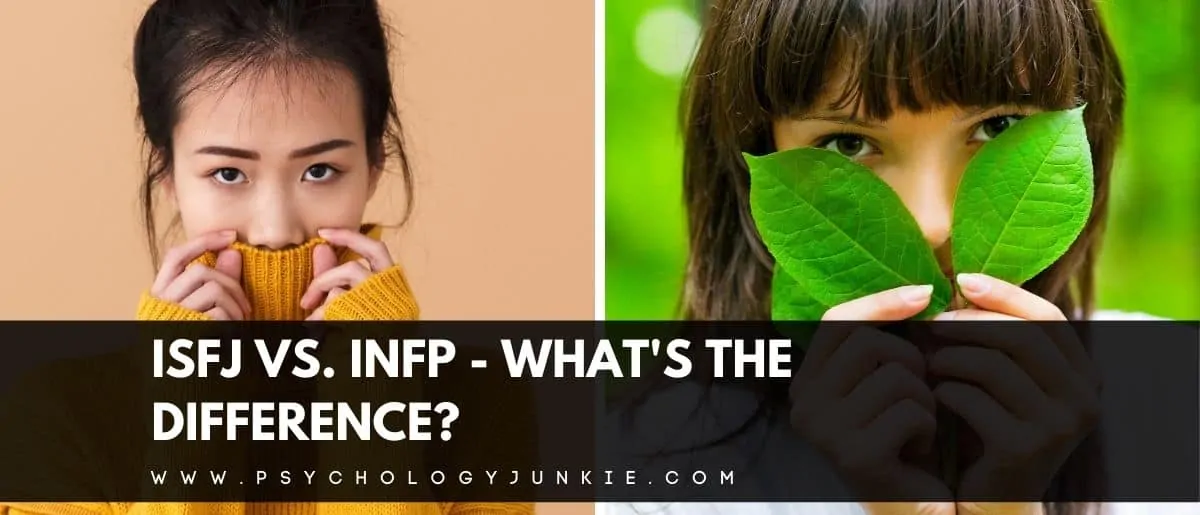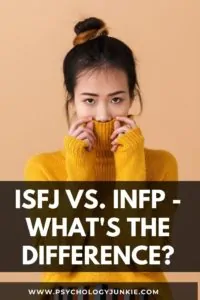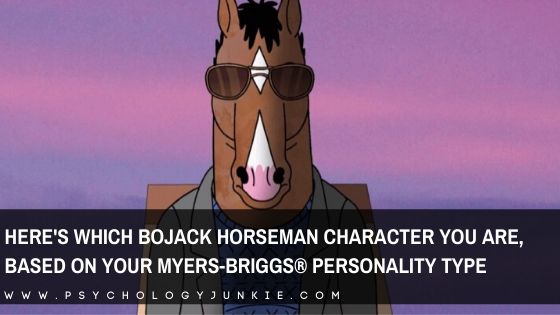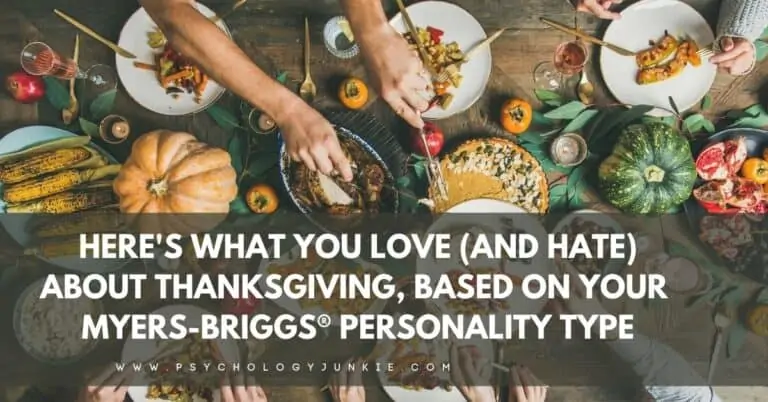ISFJ vs INFP – What’s the Difference?
Have you ever wondered if you’re an ISFJ or an INFP? Or are you an ISFJ or an INFP trying to figure out how to get along with this other type?
It’s that age-old question. The one everyone asks and few have the means to answer.

How do we differentiate two cuties?
ISFJ vs INFP – What’s the Difference?
On the surface level, ISFJs and INFPs can be mistaken for each other without a thorough inspection. Both types tend to carry a general sense of “softness.” This soft quality roughly translates to a light, accepting manner than unconsciously gives off a call for protection against the dragons, demons, and warlocks that don’t actually exist around them…usually. They often share some general character traits that make solidifying their type muddy if they aren’t properly evaluated. For example, both types tend to be less talkative with strangers, listening deeply to whoever speaks and providing a kind space for others to communicate. Stereotypically, INFPs carry a quiet mystery and ISFJs carry a nurturing calm. The differences are subtle but evoke the FiNe and SiFe preferences of either party.
Wait? What’s FiNe and SiFe?
FiNe stands for Introverted Feeling (Fi) and Extraverted Intuition (Ne), the main two mental processes of the INFP. Si Fe stands for Introverted Sensation (Si) and Extraverted Feeling (Fe), the main two mental preferences of the ISFJ. But don’t worry, you don’t have to understand everything about them to keep reading. I’ll explain it all to you as we go!
Despite this softness, both types do have sticking points where they shapeshift from cuddly marshmallow to mosh pit survivalist. The dominant function of any type can be stringent with its expectations on others. INFPs have strong Fi boundaries that they often don’t recognize within themselves until others cross their line. If someone tramples on something an INFP finds significant: prepare for doom. FiNe is great at pinpointing intention and questioning why the intention is there: This is important to me, are you saying it’s unworthy? Do you know why what you said is disrespectful and what that says about you? For the ISFJ, what one “should” do when it comes to Si expectations matters greatly. SJs are often granted the term “dutiful,” and for good reason. Norms are set in place in order to uphold expectations. ISFJs hold trigger points around whether others are upholding social standards. SiFe focuses on making sure the general polite atmosphere is upheld: Why didn’t you say thank you to them? Why aren’t you consistent like we all need to be to keep this ship afloat? Do your part.
Shared Extroverted Intuition and Introverted Sensing
ISFJs and INFPs both share the Si-Ne axis, which is likely one of the biggest reasons for this common mistype.
As Introverted Sensing types, ISFJs rely on Si without even thinking. The known and expected is vastly important. ISFJs utilize the past—via memories and impressions—to know what to anticipate in the now. When something is “off” in their environment or in the people around them, ISFJs can experience a sense of anxiety. Alarm bells can ring when, for example, an ISFJ spouse notices a fast-food bag in the trash can. She only eats fast food when her boss is rude. That must mean her boss was really hounding her today. She’s probably still upset. ISFJs are confident in their use of Si, but will use their inferior function Ne haphazardly. If we take the fast-food example further, inferior Ne might do something like: If her boss was mean to her, then she’s going to be more on edge at home. If I somehow make things worse today, she’s going to pack up and leave me. Inferior Ne is not inherently rational and will take problems to extreme ends. ISxJs can suffer from anxiety spells if their Ne takes over, but they tend to appreciate people who can use the function well and offer multiple possibilities for positive outcomes. The fast-food example also shows how strong Si can be helpful. The ISFJ “knows” that every time _____ happens, it means ____ for this person/place/thing. This use of Si helps ISFJs maneuver within their relationships and know how to approach situations. Si develops expectations once meanings are learned.
INFPs have a far different relationship to their Si and Ne. INFPs spend much of their time contemplating new ways to gain insights on people with their Extraverted Intuition (Ne). Ne does not fuel extreme, irrational worry in the INFP. If worry comes for the INFP, it’s more likely centered in their inferior function Te. Of course, any type can experience anxiety, but an INFP isn’t going to look at a dang fast-food bag in the trash can and think their relationship could be over because of it. That’s a low strength, low vibrancy Ne sort of problem. INFPs are less concerned and aware of what they have come to know about the concrete world through their lived experience, while this is how ISFJs move in the world as it is their strength. INFPs don’t naturally catalogue small detail information as ISFJs do. INFPs often ignite their Si when a strong Fi response is met. INFPs usually aren’t the ones upset that their stapler isn’t where it should be.
*cough*
SJ Nation.
*cough*
Let’s put it that way, environmental details like where a stapler “needs to be” is more in the range of high Si. Lower Si would barely blink at where the stapler is. To go back to that fast-food bag example, INFPs probably won’t pay that much attention to what a piece of garbage in the trashcan means about a person. They won’t notice the subtle environmental shifts that can show an individual’s actions or mood(s). An INFP’s Si is used primarily for their own comfort needs. It’s not strong enough to track charged data like dominant Si is. Also unlike ISFJs, INFPs tend to use Ne in a positive way, producing insights about others and reaching their fundamental core. INFPs use Ne in subtly encouraging ways, helping others unlock who they really are. They find the cubby holes within the soul that other types cannot fathom. ISFJs do not share this strength in unlocking “inner selves.” ISFJs more often nurture what is already present, taking things as they are.
Sidenote: I recently recognized that high strength extroverted intuition (dominant or auxiliary Ne) will watch a film or tv series and come up with a million different ways it could have been better. I personally watch a movie and accept it for what it is. I’m not the person generating what could have been “better,” that doesn’t come to mind…unless we’re talking who Elena Gilbert from the Vampire Diaries should get with, love triangle wise. THAT I can speak to.
Extroverted Feeling vs Introverted Feeling
ISFJs use Fe while INFPs use Fi. Conflict is probably the easiest place to distinguish a high Fe user from a high Fi user. While INFPs are concerned with their personal code and responsibility to themselves, ISFJs are concerned if they are upholding their responsibly to other people. The ISFJ’s creative Fe cares greatly if the people around them are having their emotional needs met, often to the detriment of themselves. INFPs often aren’t plagued by whether their grandmother got her cup of coffee hot or cold. An ISFJ would grieve about not meeting some established need, knowing her grandmother might be disappointed if her sensory input wasn’t what she preferred. ISFJs, like other FJs, try to manage emotions to some extent. By “manage emotions,” I mean that FJs will react based on how other people react, not from a core sense of self. Fe cannot help but notice body language and facial expressions and factor that into how one approaches a room. An INFP, although not necessarily a revolutionary, could give a crud about keeping the peace if they think something has wronged their Fi. Fe concerns can actually bother INFPs. As if that social awareness and response is an act.
Fair.
Introverted Thinking vs Extroverted Thinking
As the thinking functions are lower in the function stacks of ISFJs and INFPs, they might not be the best ways to help differentiate the types. However, some subtleties might point one in a good direction.
ISFJs use Ti to analyze their past sensory input. ISFJs utilize Si-Ti to confirm or deny a sequence of behavior in the people around them and whether it makes sense with their pattern of life. ISFJs, more than anyone, are aware of this pattern of life. “My spouse gets fast-food when stressed,” is a pattern of life commentary. Great detectives, ISFJs are. Without seeing the underlying structure over time, ISFJs wouldn’t have this keen sense of meaning and expectation. INFPs, unlike ISFJs, do not use logical sequencing to approach others. INFPs are actually further removed from their thinking process than ISFJs are, given their Te is in the inferior position.
So how does Te show up in the INFP? Usually INFPs want to have effective methods regarding their work and time, but are so unaware of how to do this that they can spend a vast amount of time thinking about doing things but actually doing none of it. While ISFJs become trapped by things like potentially losing their loved one over a dang fast-food bag in the garbage (life is hard sometimes, okay?), INFPs will stress themselves out over whether they’re doing things in the best way possible. They effectively (ha!) immobilize themselves because of this. INFPs want to be effective and show progress but they don’t always know how to do this. Part of this issue lies in their Fi, which has an almost opposing need to Te in some sense. Fi tells INFPs to do right by themselves, and that doing right often means not turning into a productive robot and subverting what they would rather do. An example might be the INFP who can’t decide on a college major and instead of starting courses and working through things to figure out what speaks to them, they choose not to go to college at all.
Fictional Case Study: Little Women
On the surface, ISFJs and INFPs have similar demeanors, but their attention to information naturally diverges. I like to think of Meg and Beth from Little Women as great examples of how ISFJs and INFPs might differ. That general softness I’ve described is present in both of their characterizations. We see Meg (ISFJ) nurture her sisters when they are in need of an uplift, but she also polices her sisters when they fail to uphold social customs or act out cruelly with one another. What matters to Meg is the mood of the room and whether she is acting appropriately within a given context. With Beth (INFP), we witness a compassionate figure who, although kind, does not nurture her sisters in the traditional sense, but provides a strong connective space for them to speak. She truly tries to know her siblings at their core and encourages them to strive towards what would authentically make themselves happy. This will towards encouraging others to be their authentic selves is seen in the case of encouraging her sister Jo to write.
There is a great scene within the most recent Little Women (2019) film that shows how an ISFJ or INFP might respond in a conflict situation. You can see it below:
When Amy destroys her sister Jo’s manuscript (which she had been working on for some time), Jo becomes very upset and tries to beat on Amy in response. The film then cuts to Jo leaning entirely on Beth (INFP), who, although limited in emotional expressiveness, is decidedly present for Jo. Beth does not try to pat Jo or make her happy. Beth lets Jo cry as she needs to. As Jo weeps, Beth’s face barely moves from its neutral state (which seems quite common for Fi dominants, in my experience). Whereas Meg (ISFJ) leans over Jo, trying to offer comfort from the other side. Her facial expressions shift as each person says their piece, knowing and accepting the outer responses of others with her Fe and responding accordingly. Beth and Meg both offer comfort to their sister Jo, but in different ways that show up subtly.
My Own Mistype
As I mistyped as an INFP initially, I know that it can be a struggle to evaluate cute levels.
Imma beat a dead horse with that one.
This is fine.
I’m a cupcake.
As both ISFJs and INFPs are natural introverts, are oriented towards people, and share prevalent cognitive functions, it’s easy to see how one could mistype oneself.
A friend of mine corrected my own unawareness through this telling example:
A teacher asked me to create a video encouraging high school kids to study abroad. I had studied abroad in China several years prior and she thought I might grant some helpful insight. After making the video, I had a friend watch over mine to provide feedback.
Her: Jami, you literally talked about disaster preparation for ten minutes. Bring your EpiPen if you have an allergy? Enjoy your friends before you have to leave? Make sure you have enough money to buy food before you buy other things? Really? What about all of the amazing things you saw in China? Or the new places students could see? What about providing different ideas for what they could do? Or what you wished you could have done, if you had a second chance to go?
My mind went blank. I was given no direction on what to say to these high schoolers prior to the video. Thus, when I made the video, the information I provided was the most relevant and important information that I thought a high schooler should know. I thought it most important to protect the students from potential mishaps by helping them “prepare” for a trip to an unknown place.
Welcome to trademark SiFe trying to watch out for others by way of an inferior Ne-fueled logistical overload…this is probably where the stereotype of ISFJs being the “moms” of the type community come from.
I always have snacks too.
Crap.
This video experience was a pivotal one that helped me recognize I was an ISFJ mistyped as an INFP. Had an INFP made the video, it probably would have been more in line with what my friend desired from a travel video. An INFP, without direction, might talk about how the experience shaped them as a person, the wonder at being in a new place that one couldn’t possibly imagine without being in. They might note some general references to a range of locations and cuisine that might help students find themselves.
And what did I tell students? Bring your EpiPen.
Gawd.
The INFP version sounds much more exciting, sure.
But I was trying to help students…not die?
Super adorbs of me, right?
Onward
For the individual trying to figure out whether they are an ISFJ or an INFP, I would suggest making a video or writing something in order to help someone solve a problem. The information I naturally focused on within my study abroad video came out without direction or cue from anyone else. That is the sort of information you need to evaluate. Answer a new question and see what you are actually saying, as well as the intent behind it. I needed another person’s perspective to help me see what was happening within myself with new eyes. You might as well.
Good luck!
Want to Know More?
Find out more about your personality type in our eBooks, Discovering You: Unlocking the Power of Personality Type, The INFJ – Understanding the Mystic, The INFP – Understanding the Dreamer, and The INTJ – Understanding the Strategist.
About the Author:










Eh, I agree that INFPs are less emotionally expressive than ISFJs. The emotions are inside after all. That’s why it’s called introverted feeling, because well. . . the feeling is introverted in yourself. In my experience, INTPs are more openly expressive emotionally than even INFPs, though I admit there isn’t much depth or complicated details to the emotions I feel inside. Well, it is just as deep as any other human being, but it’s definitely not as complicated. Actually, it’s fairly simple. I can describe often what I’m feeling with one or a few sentences at a time. INFPs can write entire books on the feelings they have in any one moment. It’s interesting really. While we’re not as emotionally expressive as FJs, we do show some level of enthusiasm for things, especially intellectual hobbies of any kind, or we might express more open passion and anger over disproving someone in an argument, for example. Though ETPs are clearly more expressive compared to us ITPs, but well, IFPs are more of a mystery to me with their emotions. They’re not as straightforward to read. While I’m sure there are bubbly and positive INFPs out there, most seem pretty emo or goth in style, . That, or they are pretty positive and fluffy in style whether in fashion or their art, but their personality is just full of err. . . lots of darkness. They’re definitely slower to open up about their emotions even with everyday hobbies of likes and dislikes, or being able to express emotions over even just surface level topics TPs can do. It takes a lot to get them to trust you, is often what I gather.
I cannot thank you enough for this article. I thought I was an INFP for many years. After reading this repeatedly, observing myself for several weeks, and reading and learning everything I could about ISFJ’s, I realized I am actually an ISFJ! This has been an amazing, eye opening experience! I have been filled with joy every day coming to know my true type. So many things have been explained that didn’t quite fit. Thank you from the bottom of my heart for helping me know myself better.